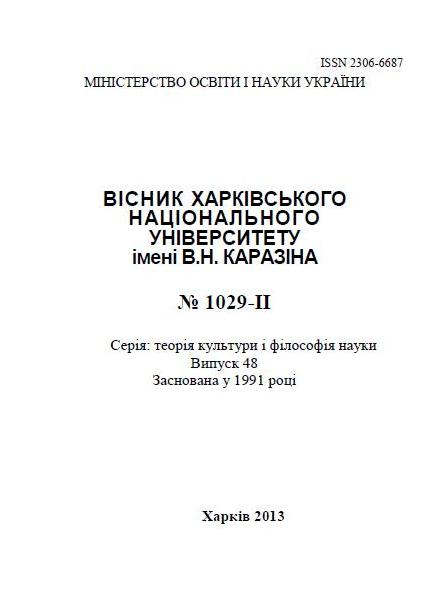ЕВРАЗИЙСКАЯ ИДЕОЛОГИЯ И ТЮРКСКИЕ ИСТОРИЧЕСКИЕ МИФЫ: ГЕОПОЛИТИЧЕСКИЙ КОНТЕКСТ
Abstract
В данной статье говорится о таком феномене ХХ века, как евразийская
идеология. Проводится анализ евразийства, рассматривается история этого движения,
начиная с зарождения в 20-х годах ХХ века, его развития в середине ХХ века в трудах
Гумилева и заканчивая современностью, в которой евразийство стало полноценной
государственной идеологией, используемой различными странами постсоветского
пространства. Описывается и анализируется современная ситуация в государствах
евразийского региона, которые так или иначе используют эту идеологию для различных
внутреннеполитических и внешнеполитических целей.
Крючков Дмитро ЄВРАЗІЙСЬКА ІДЕОЛОГІЯ І ТЮРКСЬКІ ІСТОРИЧНІ МІФИ:
ГЕОПОЛІТИЧНИЙ КОНТЕКСТ У даній статті йдеться про такий феномен ХХ
століття, як євразійська ідеологія. Проводиться аналіз євразійства, розглядається
історія цього руху, починаючи з зародження в 20-х роках ХХ століття, його розвитку в
середині ХХ століття в працях Гумільова і закінчуючи сучасністю, в якій євразійство
стало повноцінною державною ідеологією, використовуваної різними країнами
пострадянського простору. Описується та аналізується сучасна ситуація в державах
євразійського регіону, які так чи інакше використовують цю ідеологію для різних
внутрішньополітичних і зовнішньополітичних цілей.
Ключові слова: Євразія, євразійство, геополітика, тюрки.
Dmitry Kriuchkov EURASIAN TURKIC IDEOLOGY AND HISTORICAL MYTHS: THE
GEOPOLITICAL CONTEXT The purpose of this article is to analyze and find the relationship
between the Turkic historical myths and ideology of the pre-Soviet, Soviet and post-Soviet
Eurasian contemporary culture in Russia, Kazakhstan and neighboring states. Eurasianism, an
ideology, can rightly be considered one of the ways of further development of the geopolitical
region in general, and each country in particular, making it a priority to study and necessary.
Thus, it is necessary to analyze the development of Eurasian concept from Russian
immigrants, among whom Eurasianism was born as a movement with ideological components,
trace the role played in the Eurasian doctrine Gumilev, how Gumilev proves the uniqueness of
the region and its unique culturally based his theory of ethnogenesis by synthesis Slavic and
Turkic peoples.
Also, it is important to fully consider and evaluate the role of the modern ideology of
Eurasianism as early as twenty-first century, in such powerful Eurasian countries as Russia and
Kazakhstan that claim to leadership in the region, note the role played by ideology in both
countries.
We clearly see that Eurasianism, an ideology, is now used by various States to
perform certain tasks and solve certain issues, such as an internal nature and external. For
Russia, Eurasianism was a way justify the uniqueness of their own culture, a particular ideology,
which can be used as a basis for national and state development in the future. For Kazakhstan,
as a state that gained independence only recently, Eurasianism - a kind of way to the West, exit
to the west field and geopolitical space. Thanks Eurasianism Kazakh politicians can unite
diverse population of the state around one idea, profitable as in the field of foreign policy and
domestic. For the Tatar people, Eurasianism is one way to justify its claim to independence.
It is also important to consider the impact of Eurasianism and the contemporary
Ukraine and Ukrainian culture, because, being directly part of Eurasia, we also face a
geopolitical choice between East and West.
Keywords: Euroasia, Euroasian ideology, geopolitics, the Turkish nations.




